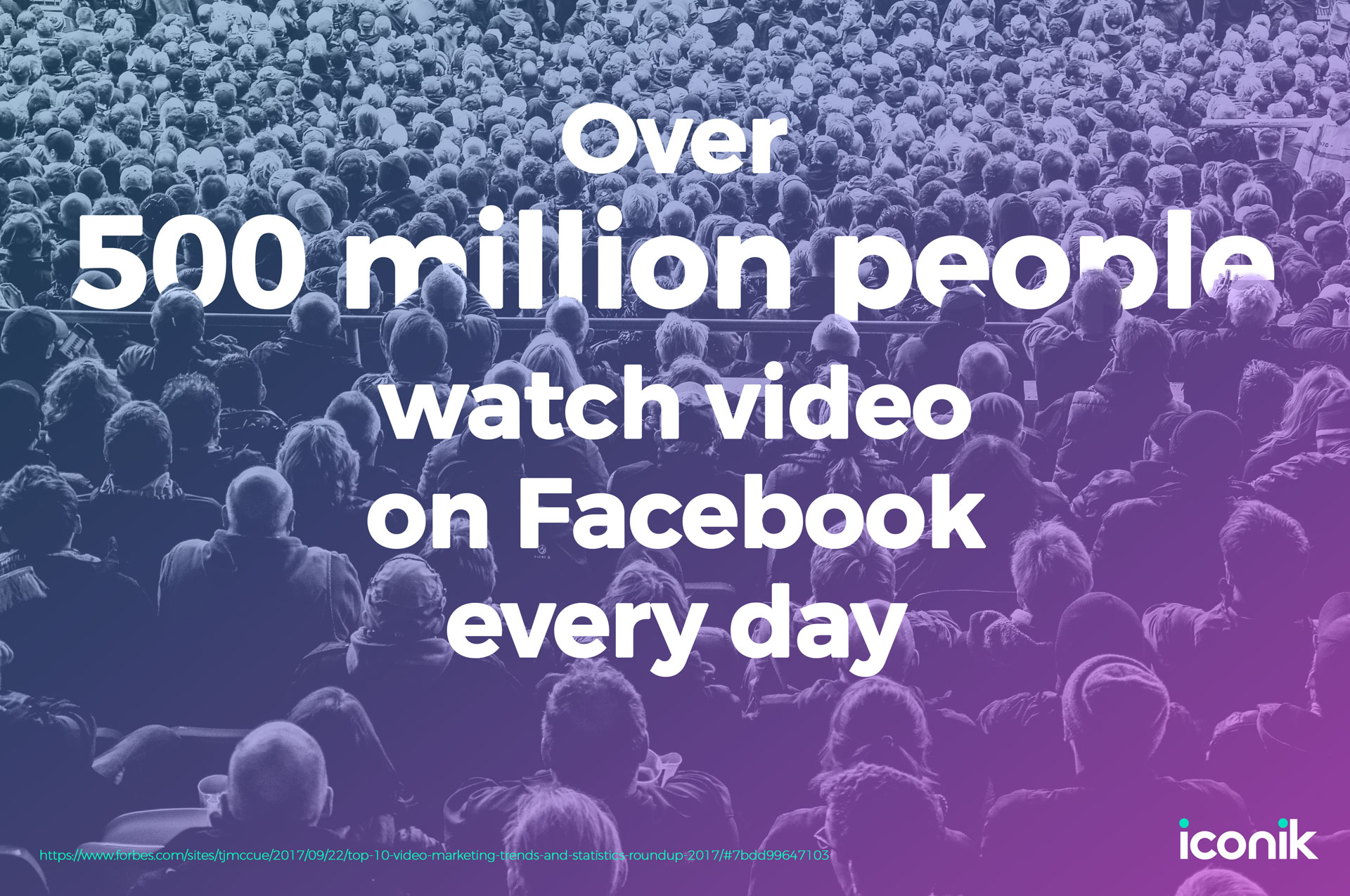The Latest Video Marketing Trends that every Marketer Needs to Know
Video has become so prolific that 100 million hours of video content is watched on Facebook every single day and 10 billion videos are watched on Snapchat. But a growing proportion of this can be attributed to video for marketing – now a prominent use of video. So what are the latest trends in video for marketing and how effective is the medium really? Spoiler alert: the answer is VERY.

Nowadays, the average consumer would find it pretty difficult to avoid watching some form of video content during a typical 24 hours on Earth. The social networking boom has created a platform where an audience of billions is easily accessed and video distribution is more or less free. As a result, video has become so prolific that 100 million hours of video content is watched on Facebook every single day and 10 billion videos are watched on Snapchat. In light of this, Cisco predicts that video will account for 82% of all internet traffic by 2021.
Although much of this content is produced by amateur users for a number of different purposes, a growing proportion can be attributed to video for marketing – now a prominent use of video. This article will explore the latest trends in video for marketing, as well as highlighting some of the most effective examples of its use.
Video Strategies
At present, 60 percent of marketers say they use video, but this looks set to grow with 73 percent planning to increase their use of the medium, according to a report published by Social Media Examiner. To put it plainly, one of the biggest trends to report is that organisations are building true video strategies, with video playing a pivotal role in broader marketing strategies. On top of this, both video marketing strategies and those of a broader nature are more closely linked to social media strategies than ever before. As we have already mentioned, social media presents an opportunity to leverage massive audiences and monetise attention, once it has been captured by video content of course.

It’s not hugely surprising that brands and organisations are beginning to produce more and more video content when we consider that 73 percent of B2B marketers say that video positively impacts marketing ROI. This is because video is so inherently engaging by its very nature, especially compared with other mediums like text and images. Social video actually generates 12 times more shares than text and images combined. Inevitably, with this boom in video comes increased competition for viewing time, leading to some highly innovative uses of the medium in an attempt to up engagement levels.
Arguably, the top two benefits of social media video marketing are increased business exposure and increased traffic. 75 percent of marketers report positive results from video content, in terms of increasing traffic. But in some cases, video has become so powerful that it forms the basis of entire marketing strategies, and even businesses.
The Tasty Phenomenon
Buzzfeed’s Tasty Facebook page currently has 93,400,654 likes – that’s over one percent of the world’s population. Most of the page’s posts are birds-eye-view videos of delicious meals and snacks being made by an unknown chef. It’s most watched video? A 1.44-minute-long video called ‘sliders 4 ways’, featuring 4 recipes for what are, essentially, tray-cooked burgers. Not only has this video been viewed 203 million times, but it has garnered 1.4 million interactions, 5.5 million shares and 289,000 comments.
When we think about recipes and cookbooks, very few of us would enjoy reading them for fun. But when brought to life in front of our eyes, it’s a much more engaging proposition. Tasty’s business is based around video, but from this the company pushes other products including customisable cookbooks and its OneTop, an induction cooktop featured in many of its videos.
The brand has done everything right to facilitate the level of engagement reached by its videos. For one, there are separate pages targeted to different regions and countries in order to cater to cultural differences (as there often is when it comes to cuisine). There is also a page for healthier recipes called Goodful. Unlike a lot of other cooking-related videos, Tasty videos are also short and easy to follow. And because the videos don’t require sound to be fully enjoyed, they can be watched anywhere at any time. From the angle of the videos, the user is immersed in the process, giving the illusion that he or she is participating. It’s a highly effective technique with quantifiable results.
Emerging Technology
Inevitably, with this boom in video comes increased competition for viewing time, leading to some highly innovative uses of the medium in an attempt to up engagement levels. Alongside this, emerging technology is being explored as an added way of boosting the effectiveness of video marketing.
Technology such as virtual reality, augmented reality and 360-degree video are no longer gimmicks – they can be seriously effective marketing tools. Having said this, they must be used correctly in order to enhance content, rather than as a novelty. AR and VR are such big concepts that they have coined a new category: immersive video. This looks set to become really popular, especially as more content is produced and the fight for viewing time intensifies. What I mean by this is that regardless of how much content a viewer would like to watch, the average individual only has so many hours in a day. VR and 360-degree content can, however, be more commanding of a viewer’s attention and prevent endless scrolling, so to speak.
Furthermore, as this technology improves we’re likely to see even better video content produced. At the moment, 4K resolution is slowly becoming the norm and although video files of this size will add to the challenge of managing growing content libraries, the added quality can only mean more engaging content.
Already, 360-degree video is proving an effective marketing tactic. A 360-degree ad from Hong Kong Airlines, for example, was 35 times more effective than the very same 2D version. Another campaign from the University of Sydney featured a 360-degree tour of the campus and surrounding areas. According to the university, nearly 20 percent of its student cohort is international, and so the opportunity to experience the social and cultural environment of Sydney before arriving is clearly beneficial and something only very few mediums could easily facilitate.
The travel industry also reports great success from VR and 360-degree marketing content which can allow prospective vacationers to experience a destination before purchasing a holiday, in a highly sensory way. When Thomas Cook introduced promotional VR videos of certain tours in ten of its New York offices, the company reported a 190 percent lift in the sale of promoted tours and a 40 percent ROI.
With 360-degree video, there is an element of personalisation in that the viewer chooses how to engage and where to focus their attention. This is a highly unique trait and one which is almost irresistible to viewers who are often inundated with similarly-formatted video content of no real interest. According to Business Insider UK, 360-degree video and other immersive video can “provide the impactful, emotion-driven storytelling that's needed to capture the attention of consumers and cut through the saturated ad space.”
Conclusion
If marketers want to make sure that video remains a powerful marketing tool (and continues to grow in effectiveness) they must realise that a good video needs to tell a good story in order to be memorable, and to tap into people’s emotions. In short, it comes down to personalised storytelling, without which video content is just noise and something to ‘pass the time’. With social networks now prioritising meaningful engagement over passive consumption, marketers need to consider how to attract but also keep a viewer’s attention when they are building ever-important video strategies.